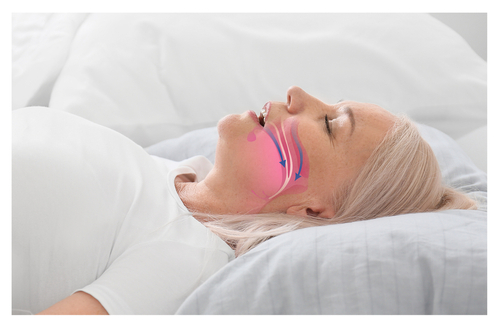Sleep apnea is a common sleep disorder that affects millions of people worldwide. It is characterized by interruptions in breathing during sleep, which can lead to a variety of symptoms and health complications. If you or someone you know snores loudly and feels tired even after a full night’s sleep, it is important to consider the possibility of sleep apnea.
In this blog, we will explore the different types of sleep apnea, discuss the symptoms and risk factors, and provide tips for managing and treating sleep apnea. We will also address frequently asked questions about sleep apnea and its effects on overall health.
Understanding Sleep Apnea
Sleep apnea is a sleep disorder characterized by pauses in breathing or shallow breaths during sleep. Sleep apnea can have a significant impact on daily life, affecting energy levels, mood, and overall well-being. By understanding the causes and symptoms of sleep apnea and implementing effective management strategies, individuals with sleep apnea can experience improved sleep quality and better overall health.
Recognizing the Symptoms & Signs of Sleep Apnea
Recognizing the symptoms of sleep apnea is crucial for early detection and effective management. Some common symptoms of sleep apnea include:
- Loud, disruptive snoring, often accompanied by choking or gasping sounds
- Pauses in breathing during sleep, reported by a bed partner or family member
- Daytime sleepiness and fatigue, even after a full night’s sleep
- Morning headaches and dry mouth
- Difficulty staying asleep and frequent awakenings
- Trouble concentrating and decreased cognitive function
- Irritability, mood swings, and depression
Tip: Seeking Medical Advice Can Help
If you suspect that you or a loved one may have sleep apnea, it is important to seek medical advice for a proper evaluation and diagnosis. While loud snoring and daytime sleepiness are common symptoms of sleep apnea, they can also be signs of other sleep disorders or underlying medical conditions.
A sleep specialist, such as a pulmonologist or otolaryngologist, can conduct a thorough evaluation and recommend appropriate tests, such as a sleep study, to confirm the diagnosis. They can also assess any underlying medical conditions that may be contributing to sleep apnea.
Once diagnosed, treatment options for sleep apnea can be explored. These may include lifestyle modifications, such as weight loss and avoiding alcohol, as well as medical interventions like continuous positive airway pressure (CPAP) therapy or surgery. The best treatment plan will depend on the severity of the sleep apnea and individual factors.
Exploring Causes and Risk Factors
Understanding the causes and risk factors of sleep apnea can help individuals recognize their own susceptibility and take appropriate steps for prevention and management. Some common causes and risk factors of sleep apnea include:
- Obesity: Excess weight can contribute to the narrowing of the airway, making it more likely for sleep apnea to occur.
- Heart disease: Certain heart conditions, such as congestive heart failure, can increase the risk of developing sleep apnea.
- Family history: Sleep apnea can run in families, suggesting a genetic component to the disorder.
It is important to note that while these factors can increase the risk of sleep apnea, not everyone who has these risk factors will develop the condition. Other factors, such as age, gender, and certain medical conditions, can also contribute to the likelihood of developing sleep apnea.
Tip: Lifestyle Changes May Need To Be Made
Lifestyle factors can play a significant role in the development of sleep apnea. Obesity, for example, can increase the risk of sleep apnea due to excess weight putting pressure on the airways. Making lifestyle changes, such as maintaining a healthy weight through diet and exercise, can help reduce the risk of sleep apnea.
Genetic factors can also contribute to the likelihood of developing sleep apnea. If you have a family history of the condition, you may be more prone to developing it yourself. However, even if you have a genetic predisposition to sleep apnea, making lifestyle changes and seeking appropriate treatment can still help manage the condition effectively.
Tip: Your Genetics May Be Causing Environmental and Health-Related Risks
In addition to lifestyle and genetic factors, there are also environmental and health-related risks associated with sleep apnea. Exposure to certain environmental risks, such as secondhand smoke or air pollution, can increase the likelihood of developing sleep apnea.
Certain health conditions can also contribute to the risk of sleep apnea. For example, individuals with nasal congestion or allergies may have a higher risk of developing sleep apnea due to difficulties in breathing through the nose. It’s important to address these health conditions and seek appropriate treatment to help manage sleep apnea effectively.
Diagnosing Sleep Apnea
Diagnosing sleep apnea typically involves a combination of a sleep study and a professional evaluation.
This study involves monitoring various aspects of sleep, including breathing patterns, brain activity, oxygen levels, sleep patterns, eye movements, blood oxygen levels, and heart rate. The results of the sleep study can help healthcare professionals determine the severity of sleep apnea and design an appropriate treatment plan.
During the diagnosis process, healthcare providers may also measure your blood oxygen levels to determine the impact of sleep apnea on your body. This information will help guide the appropriate treatment plan for managing this condition effectively.
Professional Evaluation and Tests
A professional evaluation is an essential part of the diagnosis process for sleep apnea. During this evaluation, a sleep specialist will conduct a comprehensive assessment of your symptoms, medical history, and lifestyle factors to determine the presence and severity of sleep apnea. In addition to a thorough evaluation, various tests may be conducted to gather more information. This test helps identify the presence and severity.
Based on the results of the professional evaluation and tests, the sleep specialist will be able to provide a diagnosis and recommend appropriate treatment options, such as lifestyle changes, sleep medicine, or the use of a continuous positive airway pressure (CPAP) device.
Understanding Your Diagnosis
After receiving a diagnosis, you will know the specific type of sleep apnea you have, whether it is obstructive sleep apnea (OSA), central sleep apnea (CSA), or another type.
Understanding your diagnosis is important for managing your sleep apnea effectively as it allows you to make informed decisions about treatment options and lifestyle changes. Once diagnosed, your healthcare provider will work with you to develop a personalized treatment plan based on your specific needs.
Tip: Understand Your Treatment Options for Sleep Apnea
There are various treatment options available for managing sleep apnea. The most common treatment is the use of continuous positive airway pressure (CPAP) therapy. This involves wearing a mask that delivers a steady stream of air pressure to keep the airway open during sleep. CPAP therapy is highly effective in reducing the symptoms of sleep apnea and improving sleep quality.
In addition to CPAP therapy, lifestyle changes can also help manage sleep apnea. These may include weight loss, regular exercise, avoiding alcohol and sedatives, and maintaining good sleep hygiene. These lifestyle changes can help reduce the severity of sleep apnea and improve overall sleep quality. In some cases, surgery or the use of oral appliances may be recommended as treatment options.
Tip: How to Livie with Sleep Apnea
Living with sleep apnea requires daily management to ensure optimal sleep quality and overall health. This involves adhering to the recommended treatment plan, making necessary lifestyle changes, and maintaining good sleep hygiene.
In addition to managing the physical aspects of sleep apnea, it’s important to address the impact on mental health. Sleep deprivation and daytime fatigue can take a toll on mental well-being, so it’s crucial to prioritize self-care and seek support if needed. Regular check-ups with a healthcare provider are also important for monitoring sleep apnea and adjusting the treatment plan as necessary.
Daily Management Tips
Daily management of sleep apnea involves implementing lifestyle changes and practicing good sleep hygiene. Here are some tips to help manage sleep apnea effectively:
- Maintain a regular sleep schedule by going to bed and waking up at the same time every day.
- Create a sleep-friendly environment by keeping the bedroom dark, quiet, and cool.
- Use devices such as a CPAP machine or oral appliance as prescribed by a healthcare provider.
- Avoid caffeine and heavy meals close to bedtime.
- Practice relaxation techniques, such as deep breathing or meditation, to promote relaxation before bed.
- Avoid smoking and limit alcohol consumption, as these can worsen sleep apnea symptoms.
- Consider using a humidifier in the bedroom to prevent dryness in the airways.
- Maintain a healthy weight through regular exercise and a balanced diet.
By incorporating these daily management tips into your routine, you can help improve your sleep quality and manage sleep apnea more effectively.
Importance of Regular Check-Ups
Regular check-ups with a healthcare provider are essential for managing sleep apnea effectively. These check-ups allow for the monitoring of sleep apnea symptoms, the evaluation of treatment effectiveness, and the adjustment of the treatment plan as necessary.
During regular check-ups, healthcare providers can provide valuable health information and guidance on managing sleep apnea. They can also refer you to a sleep specialist who can further evaluate your condition and provide specialized care.
By prioritizing regular check-ups and staying informed about your condition, you can ensure that your sleep apnea is properly managed and that you receive the necessary support and treatment to improve your sleep quality and overall health.
South Dayton Smiles Can Be Your Support Resource
Sleep apnea can significantly impact your well-being, but with proper understanding and management, you can improve your sleep quality and overall health. Recognizing the symptoms and seeking medical advice when needed are crucial steps. Additionally, incorporating lifestyle changes, using medical interventions, and maintaining regular check-ups can make a positive difference. Remember, managing sleep apnea is a journey that requires patience and commitment. By taking proactive measures and staying informed, you can effectively navigate this condition and enjoy better sleep for a healthier life ahead.
If you suspect that you or a loved one may have sleep apnea, it is important to seek medical advice for an accurate diagnosis and appropriate treatment plan. With the right support and management techniques, it is possible to effectively manage sleep apnea and enjoy a good night’s sleep.
Contact our team if you are experiencing any symptoms, queries, or concerns so we can provide you with the guidance and advice you need.
Frequently Asked Questions
Can Lifestyle Changes Cure Sleep Apnea?
While lifestyle changes can help manage sleep apnea, they may not cure the condition completely. However, making lifestyle changes such as weight loss, maintaining good sleep hygiene, and avoiding alcohol and smoking can significantly reduce the severity of sleep apnea and improve sleep quality.
How Effective Are CPAP Machines?
CPAP machines are highly effective in managing sleep apnea. They provide a continuous flow of air pressure to keep the airway open during sleep, improving sleep quality and reducing sleep apnea symptoms. However, compliance with CPAP therapy is crucial for its effectiveness, as consistent and regular use is necessary for optimal results.
What Are the Long-Term Effects of Untreated Sleep Apnea?
Untreated sleep apnea can lead to various long-term health complications. It has been linked to an increased risk of cardiovascular disease, heart failure, high blood pressure, and atrial fibrillation. It’s important to seek appropriate treatment for sleep apnea to prevent these potential long-term effects.
Can Children Suffer from Sleep Apnea?
Yes, children can suffer from sleep apnea. Sleep apnea in children is usually caused by enlarged tonsils or adenoids and can lead to symptoms such as snoring, restless sleep, and daytime sleepiness. Treatment options for pediatric sleep apnea may include the removal of tonsils or adenoids.
Tips for Partners of Those with Sleep Apnea
Partners of individuals with sleep apnea can play a supportive role in managing the condition. Some tips for partners include learning about sleep apnea, developing coping strategies together, providing emotional support, improving sleep quality by creating a sleep-friendly environment, and maintaining open communication.

 Meet Dr. Botti
Meet Dr. Botti
 Meet Dr. Scranton
Meet Dr. Scranton
 Our Team
Our Team
 Patient Forms
Patient Forms Online Bill Pay
Online Bill Pay Benefit Program
Benefit Program Your First Visit
Your First Visit